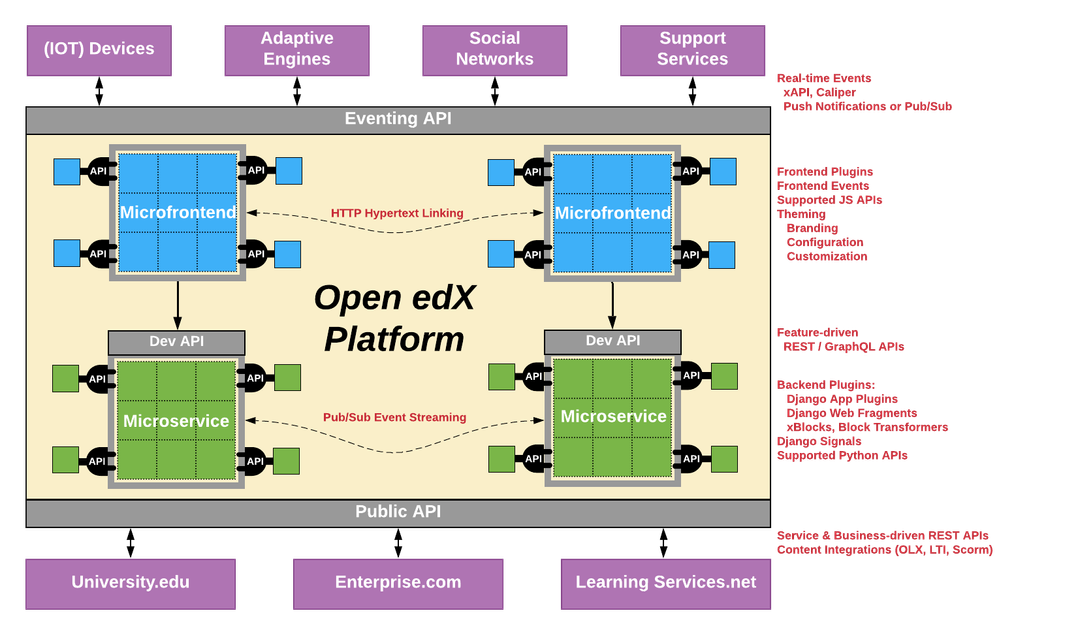An Extensible Core Platform that accelerates the evolution (via rapid development and experimentation) of platform features supports integrations in the frontend, backend, and to/from external services. As shown in the diagram and table below, a combination of technologies enable enables various integrations.
...
Diagram Link
| API Type | Status | Description | Use Cases | Technology Examples |
|---|---|---|---|---|
| Real-time |
| Events: xAPI/Caliper | In Progress | EdTech industry-standard mechanism for communicating real-time learning events to any standard-conforming consumer. See OEP-26: Real-time Events |
. Typically, the consumer leverages its own Learning Record Store as a mechanism to capture and query learning events, sometimes across multiple LMSes. Not only could this be a future replacement for today's latent batch delivery of tracking logs to university partners, but this also enables future data integrations with 3rd party EdTech tools. In the short term, universities and enterprises can leverage this capability to receive real-time learner and course data. |
| xAPI/Caliper, Web Sockets, Kafka |
| Real-time Events: Segment → Destinations | Exists | Segment.io is an external service that stores and routes real-time events to configurable 3rd party destinations. |
| Segment → Braze, Segment → Google Analytics |
| Frontend Plugin APIs | In Progress | Also known as Experience Plugins, the Frontend Plugin framework will allow 3rd party Javascript components to enhance the platform's front-end experience. The plugin code runs within the web browser, preferably within a secure sandbox |
such as an iFrame. |
These Plugins would interact and leverage the underlying data and experience of the frontend page through well-defined plugin APIs of platform Frontend Events and platform JS Libraries. |
| Web Components, LTI, Webpack's Module Federation | ||
| Frontend Theming | Some support | The Theming framework allows Operators to customize the look-and-feel of the frontend experience without modifying the core platform. The concept of Theming is decomposed into multiple layers in order to provide decoupled and simpler building blocks, each serving different needs: Branding, Configuration, Customization. | For Open edX Operators:
| Paragon branding, Webpack config, NPM override |
| Feature-driven APIs | Exists | APIs provided by backend microservices for focused single responsibility of a feature, to be consumed by the feature's frontend experiences (mobile or web apps). See API Trichotomy Proposal for where this class of APIs fits in the tiered support level for APIs. | MFE or Mobile app accesses or manipulates data in a backend service | REST, GraphQL |
| Backend Plugin APIs | Some support | APIs that enable long-term maintenance and support of Django App Plugins. While the Django App Plugin framework allows developers to extend backend services without modifying them, the Plugins need APIs they can rely on with decoupled communication structures.
|
| Django App Plugins, Wordpress Filters, Django Events, Django Filters, Python APIs |
| Content Plugin APIs | Exists | Content Plugins can leverage the Backend Plugin and Frontend Plugin frameworks for their implementations but their purpose is specifically for authoring the course content. The XBlock framework was developed early in edX's history for this purpose, including frameworks for custom graders (Codejail, XQueue). |
| XBlock, Graders |
| Inter-service Bus Events | In Progress | An event bus is a way of allowing us to independently spin up new services without destabilizing our existing offerings. It reduces the coupling between our systems which allows them more autonomy and greater scalability, reducing the risk of systems bringing each other down with unexpected workloads. It provides a path to reduce the size and complexity of our edx-platform monolith, which in turn reduces overall development costs and time to market. It also enables innovation in the Open edX ecosystem through the same decoupling, allowing developers to access data and events via supported, well-defined APIs rather than relying on edx-platform internals or forking the code. |
| Pulsar/Kafka, Docker/Kubernetes |
| Service & Business APIs | Exists | These are synchronous Public APIs that cross organizational boundaries and denote the higher tiers of the API Trichotomy Proposal. Since these APIs are not industry standards, we need to properly define them, document them, support and maintain them - essentially treat these APIs as their own Products. |
| REST |
| Content Integrations | Exists | While the EdTech industry innovates and competes, they are leveraging standards to interoperate across platforms. In particular, they have standards for integrating and transporting content from one platform to another. This enables course teams to efficiently migrate content and offer their courses on multiple sites. LTI enables the embedded use of a learning component on a frontend page, while it remains hosted on another site. Scorm and Common Cartridge enable exporting and importing content from one site to another. OLX is an Open edX proprietary standard that serves a similar purpose to Scorm and Common Cartridge. |
| OLX, LTI, Scorm, Common Cartridge |
| Data Reporting APIs | Does Not Exist | A cross-organizational interface to access data and reports of various platform domain concepts, such as Courses, Users, Completions, etc. This class of API does not exist today. We have some universities accessing our data through other means (synchronous paginated REST APIs or manually accessed through Admin UIs), which are probably better served through a dedicated API for this purpose. Note: This capability of downloading bulk data contrasts with the "Real-time Events: xAPI/Caliper" capability listed above, which is for receiving real-time singular events. |
| GraphQL, REST, Data Mart APIs |

.png?version=1&modificationDate=1631669795901&cacheVersion=1&api=v2&width=1200)